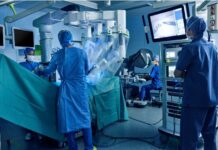Dr. Ankit Shah, Consultant – Surgical Oncology- HCG Cancer Centre, Vadodara
Breast cancer, a significant global health disease affecting millions of people, presents a complex enigma. Understanding the link between genetics and this disease is key to unlocking new approaches for prevention, diagnosis, and treatment. Forget the simplistic notion of a single “breast cancer gene.” The reality is much more complex, a rich pattern created by various elements, each playing a significant role in its way. The most prominent players are the BRCA1 (Chromosome 17) and BRCA2 (Chromosome 13) genes, which are responsible for repairing DNA damage. Transmutations in these genes, often passed down through families, substantially improve breast cancer probability. But that’s not where the narrative ends. Additional genes, such as CHEK2 and PALB2, contribute to a supporting capacity. Genetics, meanwhile, is only one element of the whole. The risk equation is influenced by a combination of factors such as age, lifestyle decisions, and environmental exposures. It is essential to comprehend these relationships so that people can make informed decisions regarding their health and well-being.
Hereditary breast cancer accounts for 5–10% of instances; these cases are believed to be caused by direct gene changes (mutations) inherited from one’s parents.
- BRCA1 and BRCA2: An inherited mutation in either of the two genes is the most common cause of inherited breast cancer. These genetic factors aid in the fabrication of proteins in healthy cells that fix broken DNA. These genes’ mutated forms may cause abnormal cell proliferation, which may result in cancer.
- You are more likely to get breast cancer if you receive a parent’s mutant copy of either gene.
- A woman with a BRCA1 or BRCA2 gene mutation may have a 7 in 10 probability of developing breast cancer by the time she is 80 years old.
- Ovarian cancer and several other cancers are also more common in women who carry one of these gene mutations. (Men who inherit one of these mutations in the genes are also more likely to develop breast and other cancers.)
Additional Genes:
- PALB2: A protein produced by the PALB2 gene interrelates with the BRCA2 gene’s protein. This gene’s alterations may increase the risk of breast cancer.
- CHEK2: Another gene that typically aids in DNA repair is CHEK2. Breast cancer risk is increased by CHEK2 mutations.
Signs and symptoms:
- Lump or thickening in breast or underarm.
- Changes in the size, shape, or appearance of the breast
- Nipple discharge (not breast milk)
- Skin cellulite or crumpling
- Redness, scaling, or cracking of the nipple or breast skin.
Risk Factors: Beyond the Genetic Realm
- Regular exercise: Make exercise a regular part of your routine. The American Cancer Society recommends getting at least 150 minutes of moderate-intensity exercise or 75 minutes of vigorous-intensity exercise each week.
- Balanced diet: Keep a balanced diet that prioritizes whole, nutritious foods like fruits, vegetables, and whole grains. It’s also important to limit processed foods, red meat, and sugary drinks to reduce risk.
- Healthy weight management: Pay attention to your weight and aim to maintain a healthy BMI. This is especially crucial after menopause, as excess weight can increase your chances of developing breast cancer.
- Limiting alcohol: Drink alcohol in moderation, or better yet, limit your consumption altogether. Excessive alcohol intake can raise your risk of breast cancer.
Scientific Advancements
- Personalized medicine: There is a great potential for more focused and successful medicines by customizing care based on each patient’s unique genetic profile.
- Gene editing: Exploring ways to correct harmful mutations through gene editing technologies could potentially prevent cancer development.
- Better screening tools: Advancements in imaging and blood tests offer more accurate and personalized detection methods.
Remedies and Preventive Measures
- Consider genetic counseling: If you have a deep family history or other risk factors, hereditary psychoanalysis can help you identify your alternatives and make informed choices.
- Adopt a healthy lifestyle: Incorporate the healthy lifestyle habits mentioned above.
- Stay informed: Keep yourself informed about the latest improvements in research and medication possibilities.
As we delve deeper into the complex relationship between genetics and breast cancer, one truth stands out knowledge is a powerful tool. By understanding our genetic predispositions and making lifestyle changes, combined with the use of advanced genetic testing, we can be proactive in preventing and detecting this disease early on. This exploration of our genetic composition not only enlightens us on the intricacies of breast cancer, but also emphasizes the importance of collaboration among individuals, healthcare experts, and researchers in the relentless battle against this formidable illness. By staying informed and actively engaged, we can strive towards a future where genetics plays a minimal role in the development of breast cancer.





















